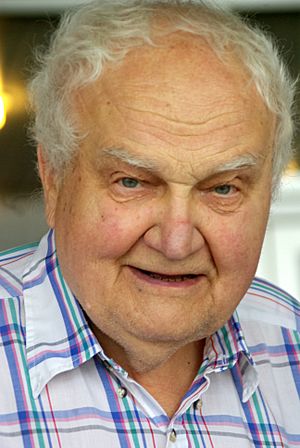Vyacheslav Ivanov (philologist) facts for kids
Quick facts for kids
Vyacheslav Ivanov
|
|
|---|---|
| Вячесла́в Все́володович Ива́нов | |

Ivanov at the 6 Moscow International Book Festival, 2011
|
|
| Born |
Vyacheslav Vsevolodovich Ivanov
21 August 1929 |
| Died | 7 October 2017 (aged 88) |
| Nationality | Russian |
| Citizenship | Soviet Union (1929–1991) → Russian (1991–2017) |
| Alma mater | Moscow State University |
| Occupation | Professor, researcher |
| Known for | Glottalic theory, Indo-European studies, semiotics |
| Awards | Lenin Prize, the USSR State Prize |
| Scientific career | |
| Fields | Language studies, signs and symbols, ancient languages |
| Institutions |
|
Vyacheslav Vsevolodovich Ivanov (Russian: Вячесла́в Все́володович Ива́нов, born August 21, 1929 – died October 7, 2017) was a very important Russian scientist. He studied languages, signs, and symbols. He was known for his ideas about how ancient languages like Indo-European sounded. He also suggested where the original home of these languages might have been. He thought it was in the area of the Armenian Highlands and Lake Urmia.
Contents
Early Life and Education
Vyacheslav Ivanov's father was Vsevolod Ivanov, a famous writer in the Soviet Union. His mother was an actress. She worked in a theater led by Vsevolod Meyerhold. Vyacheslav's childhood was difficult because of illness and war, especially when he lived in Tashkent.
He studied at Moscow University. He worked there until 1958. He had to leave because he supported other scholars whose ideas were not popular at the time. Even so, he had already made big discoveries in studying Indo-European languages. He became an expert on the Hittite language, an ancient language.
A Career in Science
Vyacheslav Ivanov had a long and active career. He worked in many important roles and taught at several universities.
- From 1959 to 1961, he led a group that studied how computers could translate languages. This was at the Academy of Sciences in Moscow.
- From 1963 to 1989, he was in charge of a special section at the Institute of Slavic Studies. This group looked at how languages are built.
- He directed the All-Union Library of Foreign Literature in Moscow from 1989 to 1993.
- He also led the Department of World Culture at Moscow State University from 1989 to 1995.
- From 1992 until his death, he was the first director of Moscow State University's Institute of World Culture.
- He also started the Russian Anthropological School in Moscow in 2003.
- In 1991, he became a professor at the University of California — Los Angeles (UCLA). He retired in 2015 but continued as a research professor.
He was also a member of many important science groups. These included the Russian Academy of Sciences and the American Academy of Arts and Sciences. He was also a Foreign Fellow of the British Academy.
Important Discoveries
In the early 1960s, Ivanov became one of the first Soviet scientists to study semiotics. Semiotics is the study of signs and symbols and how they make meaning. He worked with Vladimir Toporov on several books about languages, including one about Sanskrit, an ancient Indian language.
In 1962, he helped create the Tartu-Moscow Semiotic School. This was a group of scientists who studied signs and symbols. In the 1970s, Ivanov worked with Tamaz Gamkrelidze. They created a new idea about how ancient Indo-European sounds worked. This was called the Glottalic theory. These two scientists also worked on a new idea about how Indo-European people moved around. They wrote about this in their book Indo-European and Indo-Europeans (1995).
Other Interests
Besides his scientific work, Vyacheslav Ivanov also enjoyed other things. He wrote poetry and published several books about his memories. These books included stories about his friendships with famous writers like Boris Pasternak and Anna Akhmatova.
In 1965, he helped publish the first Russian edition of a book called "Psychology of Art." This book was written by Lev Vygotsky many years before. Ivanov added many helpful notes to it. Later, an updated version of the book came out. It included another of Vygotsky's writings about Shakespeare's play Hamlet. The English version of "Psychology of Art" was published in 1971.
See also
 In Spanish: Vyacheslav Ivanov (lingüista) para niños
In Spanish: Vyacheslav Ivanov (lingüista) para niños
- Culturology
- Alexander Dobrokhotov
- Aron Gurevich
- Mikhail Gasparov
 | Claudette Colvin |
 | Myrlie Evers-Williams |
 | Alberta Odell Jones |

